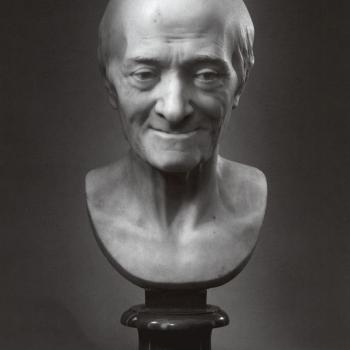So moral relativism makes us more corrupt, but it also keeps us open-minded; moral objectivism keeps us on the straight and narrow, but it also breeds intolerance. Is one of these outcomes clearly better than the other? Daniel Engber, Slate.com
Do moral absolutes exist? Is human engagement with moral principles more like a treasure hunt, where we search for something that is already there but perhaps deeply hidden, or are moral principles something that we creatively construct from various pieces of our experience and the world around us?

These questions are the stock and trade of ethics professors and moral philosophers (I ask and use them all the time), so it is not surprising that an essay published a while ago on the opinion pages of The New York Times entitled “Why our Children Don’t Think There Are Moral Facts” was written by a philosophy professor.
McBrayer: Why Do Our Children Think There Are No Moral Facts?
In this essay Justin McBrayer, an associate professor of philosophy at Fort Lewis College in Durango, Colorado, places the blame for the rampant moral relativism he finds in his undergraduate students not on godless post-modern academia, nor does he accuse parents of not doing their jobs. Instead, he blames it on common core standards in primary education, according to which facts and opinions are to be sharply distinguished as follows:
Fact: Something that is true about a subject and can be tested or proven.
Opinion: What someone thinks, feels, or believes.
Noting that his second-grade son is being taught that every claim is either a fact or an opinion with no hybrid outliers (the philosopher in him bristled at these simplistic categories), then finding out that the youngsters are being taught that any claim with a normative term in it such as ought, must, or should is an opinion and not a fact, McBrayer had an AHA! moment. So this is why my college students are relativists, he thought. “The punchline: there are no moral facts. And if there are no moral facts, there are no moral truths.”
McBrayer goes on to advocate in the final paragraph of his essay for the more nuanced position that “Value claims are like any other claims: either true or false, evidenced or not. The hard work is thinking through our evidence for which of the many competing moral claims is correct.” But many of McBrayer’s critical respondents didn’t read that far.
What several of the responses to his op-ed picked up on, instead, is his apparent claim that the moral relativism of his college students is not only ubiquitous but is to blame for other obvious problems on campus–“It should not be a surprise that there is rampant cheating on college campuses: If we’ve taught our students for 12 years that there is no fact of the matter as to whether cheating is wrong, we can’t very well blame them for doing so later on.”
In an essay on Slate.com,
Engber: The Kids Are All Right
Daniel Engber’s response to McBrayer’s argument is rather direct: “It’s total crap. There’s no evidence that college students are any less morally resolute today than they were in years past . . . There’s no evidence that moral relativism . . . causes ‘rampant cheating,’ or indeed any other substantial harm. In fact–in fact–most of the evidence point the other way.”
Accusing McBrayer of relying on “the philosopher’s favorite tools, anecdote and intuition” (that one hurt), Engber notes an almost entire lack of empirical evidence in McBrayer’s essay other than evidence that the good professor and his colleagues have been comparing anecdotes and intuitions over a beer or two. But, as Engber is quick to point out, there is empirical evidence about all of this–and most of it is contrary to McBrayer’s thesis.
Various studies have shown that people go through stages of development when it comes to their moral beliefs, and the most likely time in life for people to be skeptical about moral absolutes is during the very years that they are in college. Christopher Nelson, the former president of my undergraduate alma mater St. John’s College–a place where I spent four happy years in the middles 1970s engaged in endless relativistic conversations–noted in Huffington Post not long ago that “Dire warnings about the corrupting influence of moral relativism among college students were as alarming when I was in college some half a century ago as they are today.”
Nelson: Are We Teaching Millenials to Be Immoral?
But studies also show that most of us get over our relativistic stage—“it seems that college graduates maintain at least some moral convictions.”
Relying on my standard philosopher’s tools of anecdote and intuition, I find this debate in the public square about whether moral facts exist both misdirected and unsatisfying. I do not share McBrayer’s fears about rampant relativism, but neither do I find evidence that most of us naturally move to believing in a few moral principles as we get older to be particularly encouraging. What are those principles? Do we simply fall into the comfortable and non-reflective position of adopting a few basic rules about getting along with each other (Be nice, Don’t be a jerk, Work hard), call them moral principles and call it a day? I think human beings are naturally wired to both need and demand more than this.
I suspect that my friends and colleagues, if asked to choose, would describe me as more in the relativist than the absolutist camp when it comes to moral facts. I’m fine with that, since I believe that the dangers of unwarranted certainty far outweigh the pitfalls of relativism. A person can be certain about the truth of anything, including some pretty odious and diabolical beliefs. Using Engber’s term, moral objectivism keeps us on the “straight and narrow”—but to where? The question is not “Are there moral facts?” but rather is “On the assumption that there are moral facts, what are they?”
Which tips my hand in this debate—I want to have my cake and eat it too. I believe in the existence of moral absolutes, but also believe that they are far more difficult to identify than most of us imagine. The lifelong search for moral clarity and certainty will often look and feel like relativism. The temptation is very strong to stop along the way and declare one’s current beliefs as moral absolutes—but this temptation must be resisted.
In my “Philosophy of the Human Person” class last year, we studied Plato’s Republic—my choice for the greatest single work of philosophy in the Western tradition—from cover to cover. Plato was a dedicated absolutist both in moral philosophy and his conception of knowledge in general, but his focus more often than not is on the process of pursuing truth and clarity, not the conclusion of that process. Yeats famously wrote in “The Second Coming” that “The best lack all conviction, while the worst are full of passionate intensity.” The lifelong journey toward moral truth can become passionate but unwarranted conviction if one believes too early that one knows everything one needs to know, and it settles into the mediocrity of “whatever” if one despairs of the restless search ever having a conclusion.
Although I do not share McBrayer’s fear of relativism, the concluding challenge of his essay is one of the best contributions a philosopher can make to this discussion: “Value claims are like any other claims: either true or false, evidenced or not. The hard work is thinking through our evidence for which of the many competing moral claims is correct.” And, I might add, never assuming that we have finally gotten it right.

















